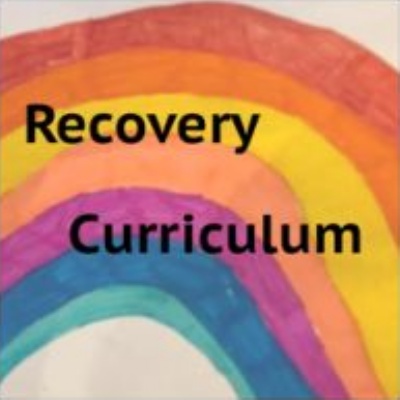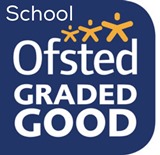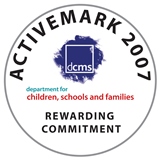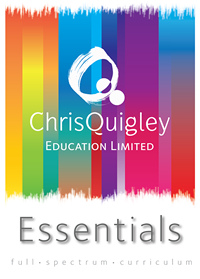Recovery Curriculum

CONTEXT
From 20th March 2020, schools were closed for all except a few pupils because of the worldwide pandemic. The UK went into lockdown, meaning that people could only leave their homes to buy food, exercise and carry out critical work.
This left parents and carers home educating their children with the support of school. Children have experienced loss of social interaction with their friends, extended family, and their teachers. They have lost their usual structure and routines as they are not able to attend school and extracurricular activities. They have been without their usual freedoms, playing outside and visiting leisure areas. Some may have experienced bereavement of friends or family. All our children have suffered some form of loss. Most of our pupils have experienced large gaps in their learning before attending our school and we are mindful that this experience may be a trigger for those pupils who experienced a myriad of negative feelings, including rejection.
Larwood School will address this through the development of a recovery curriculum, which is based on the work of Barry Carpenter and the Evidence for Learning team: “A Recovery Curriculum: Loss and Life for our children and schools post pandemic”. See further reading for more references.
AIMS
Our recovery curriculum aims to restore the mental health and rebuild the resilience of our pupils to allow them to become learners again by:
- recognising the experiences had by all
- restoring trust and relationships with staff
- re-establishing friendships and social interactions
- regaining structure and routine
- rebuilding a sense of community
- regulating their emotions and managing behaviours
- re-engaging them in learning
- preparing them for transition
HOW TO SUPPORT PUPILS
There will be a three phased approach:
1. Whole school approach
2. Personalised response (based on individual needs)
3. Deep Recovery (longer period of recovery and specialist support)
1. Whole school approach
This will encompass the main curriculum upon our return. For most pupils, this will be sufficient to meet the aims set out above, although their journeys will happen over different time frames. From the activities planned, staff will be able to identify those who need more support in their recovery which will lead to a personalised response. All classes will have more emphasis on emotional and mental wellbeing while our more traditional (SEND, Larwood lessons) will take time to embed back into the routine. All children will work with staff 1:1 to complete the WRAP workbook with their class team as well as the 1 decision nurture lessons.
"WRAP is a tool that can aid an individual’s recovery and its underpinning principles support the recovery approach. WRAP is a way of monitoring wellness, times of being less well and times when experiences are uncomfortable and distressing. It also includes details of how an individual would like others to support them at these different times.”
WRAP has 5 key principles:
- Hope: people who experience mental health difficulties get well, stay well, and go on to meet their life dreams and goals.
- Personal responsibility: it is up to you, with the assistance of others, to take action and do what needs to be done to keep yourself well.
- Education: learning all you can about what you are experiencing so you can make good decisions about all aspects of your life.
- Self-advocacy: effectively reaching out to others so that you can get what it is that you need, want, and deserve to support your wellness and recovery.
- Support: while working toward your wellness is up to you, receiving support from others, and giving support to others, will help you feel better and enhance the quality of your life.
Pupils can be identified through the completion of the WRAP model who may need more support for their emotional and mental health and this can be addressed in the personalised response either through the use of the intervention team or outside counsellors such as the Butterfly Rooms.
2. Personalised response
Where pupils are unable to engage in the holistic curriculum, further work will be undertaken by school staff such as the intervention team, or our external counsellors to enable them to meet the above aims.
3. Deep recovery
For pupils who have experienced severe trauma or bereavement, specialist support may be required in their recovery.
WHOLE SCHOOL APPROACH
“Now is the time to return to more humane approaches concerned with the fundamental wellbeing, and secure positive development of the child. Without this there will be no results that have true meaning and deep personal value to the child in terms of their preparation for adulthood.”
(Barry Carpenter & Matthew Carpenter 2020)
Recognising the experiences had by all
We will create time to share our experiences of lockdown. Some pupils will be more open to share, whereas for others it will take some time or require anonymity. We will create space within our day to allow for these conversations. It is important to note that although lockdown has caused losses, it will have been a positive experience for some, allowing for more quality family time and child led learning. We will encourage discussions around learning, play, relationships and more. This can be facilitated through circle time, 1-1 conversations, increased free-time, social stories and worry boxes, worry monsters etc.
Restoring trust and relationships with staff
Children, especially young children, will have felt a level of abandonment from school staff, through no fault of the school. It will take time to build up their trust and restore relationships. Staff will continue to nurture and support through positive words and role modelling the school values. Within the day there will be plenty of opportunity to talk and play together, allowing time for 1-1 conversations. Staffing will be kept as consistent as possible.
Re-establishing friendships and social interactions
Taking into consideration the safety procedures put into place, pupils will be given plenty of free-time or playtime in which they can re-establish their friendships. Daily circle time will allow for thoughtful discussion surrounding the value of friendship. Shared activities, like daily exercise will bring the pupils back together into teams.
Regaining structure and routine
The process of returning to a ‘normal timetable’ will be a phased one. At the beginning, there will be more free-time and child-led learning. A visual timetable will be used to create structure to the day, even if some of these times are unstructured. There will be elements of the timetable that will be constant each day, like exercise, mindfulness, and circle time. Parts of the school day that pupils will be expecting, like English and Maths, will be included in short bursts. The timetable will be re-evaluated on a regular basis to ensure that all pupils within the group are coping with the transition back to school. See appendix A.
Rebuilding a sense of community
Communication between school and home will be maintained through newsletters, phone calls and emails. Parents will be encouraged to communicate through the phone or email, to limit the physical interactions with staff. Pupils will have the opportunity to take part in whole-school projects that promote togetherness, like the Larwood Challenge of the Week. The Larwood Challenge will vary, it could be a writing competition a helpfulness competition and will allow children who participate to be recognised and earn house points (Star Dust for those in Space Hub) Work produced during lockdown will be collated and displayed in school. Through talk, groups will gain understanding of their peers and support each other.
Regulating their emotions and managing behaviours
PSHE lessons and circle time will focus on managing emotions and behaviours. The school rules will be re-established with the pupils, emphasising the questions ‘am I safe and can I be trusted?’ As well as the school values that run alongside them. Pupils will be given space to explore their feelings and seek out help to manage them. School needs to be a safe and happy place before learning can begin.
Re-engaging them in learning
Once the children feel safe and happy, they can begin to engage with their learning again. To help transition, focussed learning will be kept to short bursts in the beginning, with free time later in the day for finishing up if requested by the children. Child-led projects and story-based learning will aim to re-engage the pupils with their learning. The Maths, English and Topic based learning will mirror what is being set on the YouTube channel for those learning at home.
Preparation for transition
Transition back to school will be aided through social stories, a transition piece of work and communication from staff. Pupils will be given time to adjust to their new routines, spaces, and adults. Transition between school years will be planned through virtual meetings and tours. Larger transitions (starting school or those in year 6) will be a focus for those pupils within PSHE time.
FURTHER READING AND RESOURCES
Thinking and research:
Think piece. A Recovery Curriculum: Loss and Life for our children and schools post pandemic. https://www.evidenceforlearning.net/recoverycurriculum/
How we plan for the return to the classrooms, playgrounds and corridors of schools. https://restoreourschools.wordpress.com/
Support a Safe & Successful Return to School using the SWAN framework https://elearning.creativeeducation.co.uk/courses/support-a-safe-successful-return-to-school-using-the-swan-framework/
Five ways to help children heal after the pandemic https://www.tes.com/news/five-ways-help-children-heal-after-pandemic
Reducing Anxiety in Kids Returning to School After Isolation https://www.teachstarter.com/podcast/reducing-anxiety-kids-returning-school/?utm_source=facebook&utm_medium=social&utm_campaign=podcast&utm_content=Reducing+Anxiety+in+Kids+Returning+to+School+After+Isolation
Resources to use in school:
Posters to use in school https://www.griefrecoverymethod.co.uk/schools/
How can we best support children and young people with their worries and anxiety? https://emergingminds.org.uk/supporting-children-and-young-people-with-worries-and-anxiety-coronavirus/
Worksheets and workbooks https://www.yesfutures.org/resources-for-parents
Books beyond words https://booksbeyondwords.co.uk/coping-with-coronavirus
Wrap workbook
1Decision All About me work book/online PPT https://schools.1decision.co.uk/
Supporting staff to support children:
Supporting Parents and Children Emotionally https://rockpool.life/course/space-supporting-parents-and-children-emotionally/
How to start a conversation with children about mental health https://www.mentallyhealthyschools.org.uk/getting-started/how-to-start-a-conversation-with-children-about-mental-health/
Tips on various issues regarding mental health during the pandemic: https://www.headstogether.org.uk/60-second-support/
How to have difficult conversations with children https://learning.nspcc.org.uk/safeguarding-child-protection/how-to-have-difficult-conversations-with-children
Talking to a child worried about coronavirus (COVID-19) https://www.nspcc.org.uk/keeping-children-safe/childrens-mental-health/depression-anxiety-mental-health/
The Wrap Primary Model which will be shared on 16th June 2020
APPENDIX A
Example Daily Timetable
- Exercise (Mr V, Go Noodle, Joe Wicks, Jump start Jonny or similar)
- Breather / Drink
- Circle Time Activity
- Maths (no more than 20 mins – use what is being shared on YouTube)
- Break
- English (no more than 20 mins – use what is being shared on YouTube)
- Lunch
- Mindfulness (could use Cosmic Yoga)
- Topic activities (same as on YouTube)
- Free time (time to chat, finish work if they wish to or play)
- Story Time







